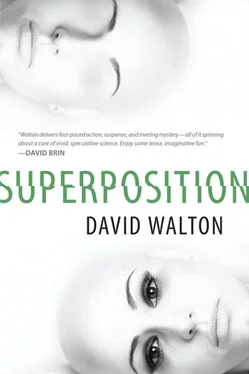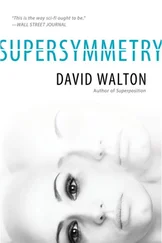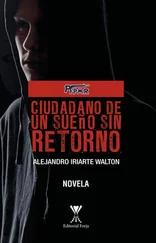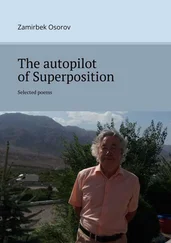I noticed that Marek had left out the “maybe someday you’ll join me” line, which we hadn’t understood at the time. I was pretty sure I knew what that meant now. At the time he wrote it, Brian still thought that the varcolacs were going to make him a god, immortal and with all their powers. He was expecting to be missing, not dead, and he thought I could read the notes on his smartpad and figure out where he’d gone, maybe even contact the varcolacs myself and join him. He didn’t expect to turn up dead.
“Did you actually read the note yourself, or did Mr. Kelley read it to you?” Haviland asked.
“I read it myself,” Marek said. “It was handwritten on password-protected smart paper.”
“And Jacob knew the password?”
“He figured it out. It was some number that was important in quantum physics.”
“So it was clear that Mr. Vanderhall wanted Mr. Kelley to get this note?”
Haviland shot up. “Objection. The witness can have no knowledge of the victim’s intentions, or even that he wrote the note.”
“Sustained,” Roswell said.
“To whom was the note addressed?” Terry asked.
“To Jacob.”
“Thank you. And who is Cathie?”
“CATHIE is a place, not a person,” Marek said. “It’s the name for the bunker where we found Mr. Vanderhall’s body.”
“So that’s how you knew to go down there?”
“Yes. Jacob interpreted the letter as telling us we should go down to the CATHIE bunker.”
“Did Mr. Kelley seem to already know what he would find in the bunker?”
“No, he didn’t.”
Terry walked Marek through how we had found Brian in the bunker, but how we didn’t call the police because we didn’t have phone reception. Terry and I had argued about whether Marek should mention the varcolac, but eventually decided not to. It was tough either way. The story didn’t hang together very well without the varcolac, but what jury would believe him if he told them we’d been attacked by a demon?
We would be asking a lot of them already. In order to generate a reasonable level of doubt in my guilt, the defense had to present another possible alternative that fit the facts. True or not, if an alternate theory was just as convincing as the defense’s theory of my guilt, then there was clearly some doubt as to whether I should be convicted for the crime. The alternative story that Terry was spinning, as had been introduced in Jean’s testimony, was that one version of Brian had killed the other one. It was a tough sell already, and Terry didn’t want descriptions of alien intelligences confusing the matter.
Marek told the jury that I had been so overcome with grief about my friend’s death that I had run away, up the stairs. He described it as a kind of claustrophobia, a need to get some fresh air, and under Terry’s gentle questioning, it sounded credible. Marek had followed, both to help me and to see if there was phone reception outside, but there wasn’t. That was when we found Brian’s car, with the keys still in the ignition, and used it to drive away.
The problem with the story was that it was mostly true, but not quite. All considering, I thought it was the best we could do, but it made me wonder how much of the trial system had to do with truth, and how much of it was a competition between the two opposing sides to see whose fiction was the more believable.
Terry dropped the bomb out of nowhere.
“When you got into the car, you discovered that you were not the only one there, didn’t you?”
“Yes,” Marek said. “Brian Vanderhall was sleeping in the backseat.”
The courtroom erupted in noise, and Judge Roswell had to bang her gavel for order.
Terry feigned confusion. “Let me understand this,” he said. “You just told us you found Mr. Vanderhall dead in the bunker, and now you’re saying he was sleeping in the backseat. Which is it, Mr. Svoboda?”
“Both. We found him in both places. There were two versions of him. One was dead, the other was still alive.”
Haviland objected again. “Your Honor, this is insane. Mr. Sheppard is turning this courtroom into a circus for the media. I move that Mr. Svoboda be placed under contempt for his mockery of these proceedings and—”
“That’s enough, Mr. Haviland,” Roswell said. “Mr. Sheppard?”
“This is the alternate theory of the defense, Your Honor,” Terry said. “As my expert witness contended earlier, this is a scientifically plausible scenario. Not only is it plausible, but we intend to prove that it actually happened.”
“Very well,” Roswell said. “Objection overruled.”
“Judge, I request a sidebar,” Haviland said.
Roswell sighed and motioned the lawyers up to the front. She switched on a noise cancelling system that prevented any of the rest of us from overhearing what was said. I saw Haviland gesticulating and rolling his eyes. Before long, Roswell took her seat again and the lawyers returned, Terry looking serene and Haviland annoyed.
“The objection is still overruled,” Roswell said. “Mr. Sheppard, please continue.”
Haviland sat, and Terry continued to question Marek. This was the point at which things got a bit sticky, since now that Brian’s double had been introduced, his departure had to be explained. Marek said nothing about the Higgs projector, nor Brian’s attempt to use it to protect them from the varcolac. He merely claimed that, after explaining some of his quantum research to them, Brian had disappeared.
“Disappeared?” Haviland said. “Into thin air?”
“Yes, sir. Jacob explained it to me as the collapse of a probability wave, but all I know is, he vanished.”
“No further questions,” Terry said.
Haviland stood, shaking his head in apparent disbelief that such nonsense had been allowed in court. “Mr. Svoboda,” he said. “I’d like to ask you about the so-called suicide note that you say Mr. Kelley found. Did you see the note before Mr. Kelley picked it up?”
I had wondered whether Haviland would ask about the note or just try to ignore it. It wasn’t really devastating to his case—his witnesses had already proven that Brian’s death couldn’t have been a suicide by any normal means. If he didn’t ask, however, it would allow the letter to stand without challenge. Haviland had apparently opted to ask.
“No,” Marek said. “Jacob found the note and then showed it to me.”
“Can you be certain he didn’t write the letter at home and then pretend that he found it to remove suspicion?”
“If he wanted to remove suspicion, he would have planted the letter in the office and left it there for others to find, not shown it secretly to me,” Marek said. It was a good point, and I saw Haviland wince.
“Let me rephrase. Do you know, beyond Mr. Kelley telling you so, that this note came from Mr. Vanderhall’s office?”
“No.”
“Where is this note now?”
“I don’t know.”
This was actually good luck for us. If we had a piece of physical evidence related to the crime in our possession, Terry would have been required to turn it over to the police, or risk considerable legal consequences, both in the trial and personally. Just having knowledge that such evidence had once existed, however, came with no such responsibility.
Haviland laid the scorn on as thick as he could. “So we have no evidence, other than your word, that this so-called suicide note ever existed or—even by your own testimony—where it came from or who really wrote it.”
“If you don’t believe me,” Marek said, stiffening, “then don’t ask me any more questions.”
“A few more, I think,” Haviland said. “You say that when you found Mr. Vanderhall’s body, you didn’t call the police because you had no phone coverage. Is that right?”
Читать дальше












